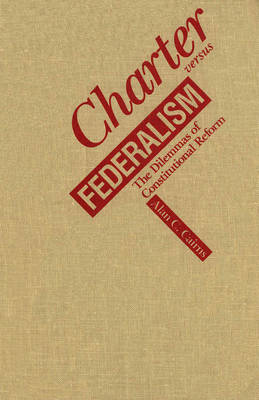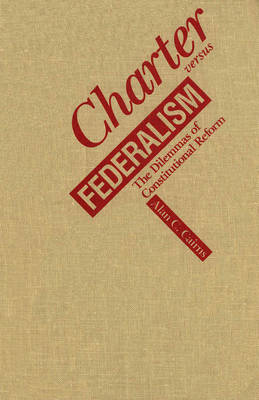
Bedankt voor het vertrouwen het afgelopen jaar! Om jou te bedanken bieden we GRATIS verzending (in België) aan op alles gedurende de hele maand januari.
- Afhalen na 1 uur in een winkel met voorraad
- Gratis thuislevering in België
- Ruim aanbod met 7 miljoen producten
Bedankt voor het vertrouwen het afgelopen jaar! Om jou te bedanken bieden we GRATIS verzending (in België) aan op alles gedurende de hele maand januari.
- Afhalen na 1 uur in een winkel met voorraad
- Gratis thuislevering in België
- Ruim aanbod met 7 miljoen producten
Zoeken
€ 156,95
+ 313 punten
Uitvoering
Omschrijving
Responding to the increasing diversity of the Canadian population -- and to an increasing sensitivity to historical diversities -- the 1982 Constitution Act amended the British North America Act and introduced the Charter of Rights and Freedoms, giving new powers to heterogeneous groups within the Canadian polity. These changes disturbed the equilibrium of an older, federalist Canada whose constitutional concerns were limited to the relative powers of federal and provincial governments and to French-English ethnic/linguistic questions. Cairns underlines the significance of international influences on the development of Canada's constitution, in particular the adoption of the Charter, and examines the constitution's role in shaping Canadians' civic identities and community conceptions. He argues that the constitution is a powerful mobilizing instrument that shapes the people subject to its authority. Canada is now populated by what Cairns calls Charter Canadians, who see themselves as rights-bearers and tend to look to the federal government as the effective focus of political community. During the Meech Lake affair, the demands of Charter Canadians and politicized aboriginal peoples clashed with Quebec's constitutional aspirations as well as older élite accommodation politics. In addition to the Charter, the 1982 Constitution Act contained a new amending formula that contradicted the Charter's message that the rights of individuals precede those of governments. This formula gave a collective of federal and provincial governments a formal monopoly on constitutional change and encouraged the belief, refuted by the Meech Lake experience, that they could amend the constitution in terms of their own self-interest and announce the results as a fait accompli. The clash between the Charter and the amending formula is constitutionally destabilizing, Cairns argues, because these two parts of the same constitution are based on different understandings of the fundamental purpose of the constitution and for whose benefit it exists. The Meech Lake fiasco, having brought Canada to the brink of disaster, clearly indicates that Canada's future constitutional health depends not only on the reconciliation of Quebec with the rest of Canada but -- respectful of the Charter's message -- on a simultaneous constitutional rapprochement between citizens and governments in the process of constitutional reform.
Specificaties
Betrokkenen
- Auteur(s):
- Uitgeverij:
Inhoud
- Aantal bladzijden:
- 160
- Taal:
- Engels
Eigenschappen
- Productcode (EAN):
- 9780773508910
- Verschijningsdatum:
- 18/02/1992
- Uitvoering:
- Hardcover
- Formaat:
- Genaaid
- Afmetingen:
- 152 mm x 229 mm
- Gewicht:
- 430 g

Alleen bij Standaard Boekhandel
+ 313 punten op je klantenkaart van Standaard Boekhandel
Beoordelingen
We publiceren alleen reviews die voldoen aan de voorwaarden voor reviews. Bekijk onze voorwaarden voor reviews.












